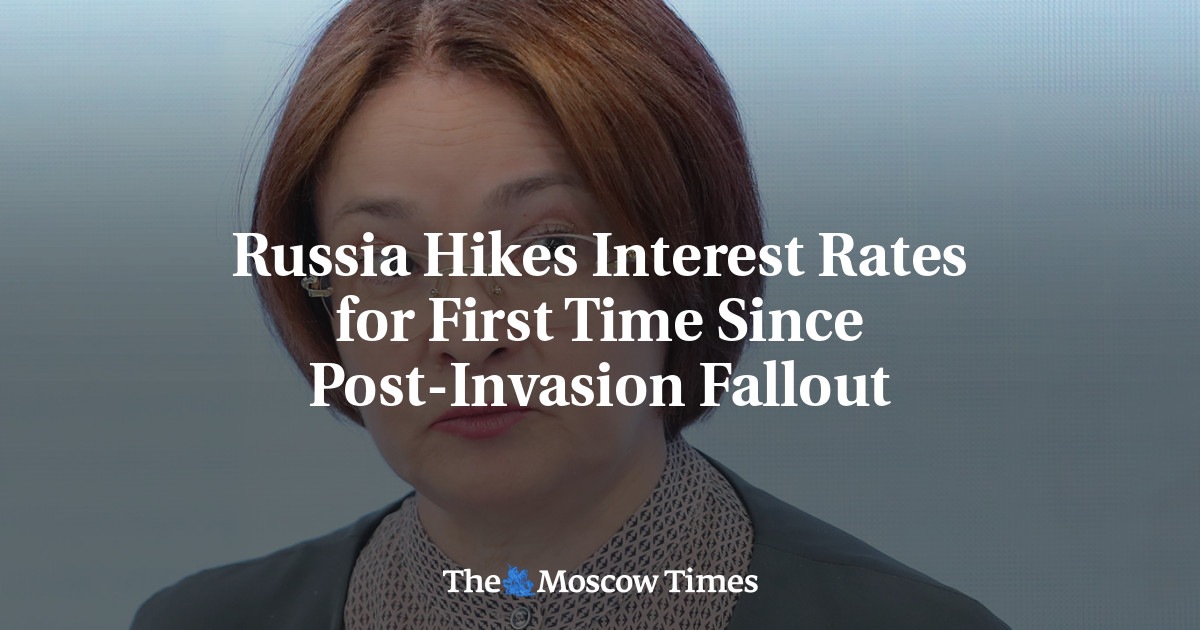
Russia’s Central Bank hiked interest rates on Friday for the first time in 16 months, as Moscow’s spending on its invasion of Ukraine, shortages across the labor market and a sharp fall in the value of the ruble trigger fresh concerns over inflation.
The regulator raised its key rate from 7.5% to 8.5% — ahead of analysts’ expectations for a more modest increase to 8%.
The move is the Central Bank’s first rate rise since four days after the invasion of Ukraine, when it hiked rates to 20% in an emergency decision as it scrambled to stabilize the Russian economy. After a series of cuts last year, the bank had held rates at 7.5% since last September.
Governor Elvira Nabiullina has since increasingly sounded the alarm about bubbling inflationary pressures due to rapid government spending and a steep devaluation of the Russian ruble — which pushes up the price of goods bought from abroad, or those made with imported components.
On Friday, the Bank said there was “persistent inflationary pressure in the economy” and raised its forecast for inflation this year to 5-6.5%.
“Inflationary pressure is on the rise. Current price growth rates, including a variety of underlying indicators, have exceeded 4% in annualized terms and are still increasing,” the Bank said in a statement.
The Russian economy has largely performed better than expected since President Vladimir Putin ordered troops into Ukraine, bucking initial predictions that GDP could shrink by 10% and inflation spiral above 20%.
Analysts credit this to the Central Bank’s introduction last year of strict capital controls, which reversed a collapse in the value of the ruble and, increasingly as the war has dragged on, billions of dollars of government spending on weapons, military equipment and salaries for soldiers.
But that extra spending, combined with the effects of Western sanctions and a collapse in Russian energy sales to Europe, have pushed the Kremlin into a $28 billion deficit in the first half of 2023.
The ruble has fallen from a high of 54 against the U.S. dollar last June to 91 on Friday.
“Normally, a fall in the exchange rate leads to a fall in demand for imports, but that hasn’t happened,” Nabiullina said at a news conference in Moscow on why the ruble’s recent weakness is pushing up prices and worrying the central bank.
She added that the main factor affecting the ruble was the fall in exports and rise in imports which has significantly shifted the supply-and-demand dynamics for the Russian currency in 2023.
In a new set of forecasts, also published Friday, the bank raised its expectations for Russia’s GDP growth in 2023 to 1.5-2.5%.
However, it predicted the value of Russian exports would fall by more than $175 billion in 2023 to a total of $414 billion. Meanwhile, it sees the current account — the difference between overall exports and imports and a key driver of the ruble exchange rate — slumping 89% from a record $236 billion in 2022 to $26 billion this year.
Nabiullina also pointed to Russia’s record-low unemployment rate of 3.3% and strong growth in consumer borrowing as pushing up prices across the economy. Russia’s industries are struggling to fill positions amid a surge in government orders to fund the war, as well as the fallout of the Kremlin’s mobilization drive, which called up 300,000 working-age men to fight in Ukraine and triggered hundreds of thousands more to flee the country in a bid to avoid the draft.
The bank said further rate rises were a possibility if inflation did not show signs of fading. Surveys show Russians consistently rate rising prices as one of the country’s most pressing issues. The country has seen multiple periods of rapid inflation and sharp devaluations in the ruble over the last 30 years, and households remain cautious about the prospect of fresh economic crises.
Analysts said the bank’s decision to surprise markets with a full percentage point increase was a sign of how serious it believes inflation risks could get in the coming months.
“If inflation continues to accelerate, that decreases the effectiveness of measures to adapt and develop the economy in the tough external environment … The regulator’s harsh rhetoric emphasizes its determination to act when necessary,” said Mikhail Zeltser, an analyst at Moscow-based brokerage BCS Investments.